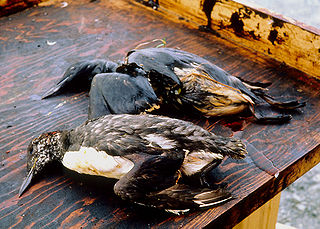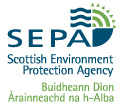
A pollutant or novel entity is a substance or energy introduced into the environment that has undesired effects, or adversely affects the usefulness of a resource. These can be both naturally forming or anthropogenic in origin. Pollutants result in environmental pollution or become public health concerns when they reach a concentration high enough to have significant negative impacts.

Pollution is the introduction of contaminants into the natural environment that cause adverse change. Pollution can take the form of any substance or energy. Pollutants, the components of pollution, can be either foreign substances/energies or naturally occurring contaminants.
Environmental science is an interdisciplinary academic field that integrates physics, biology, and geography to the study of the environment, and the solution of environmental problems. Environmental science emerged from the fields of natural history and medicine during the Enlightenment. Today it provides an integrated, quantitative, and interdisciplinary approach to the study of environmental systems.

The Department for Environment, Food and Rural Affairs (Defra) is a ministerial department of the Government of the United Kingdom. It is responsible for environmental protection, food production and standards, agriculture, fisheries and rural communities in the entire United Kingdom. Concordats set out agreed frameworks for co operation, between it and the Scottish Government, Welsh Government and Northern Ireland Executive, which have devolved responsibilities for these matters in their respective nations.

Water pollution is the contamination of water bodies, usually as a result of human activities, that has a negative impact on their uses. Water bodies include lakes, rivers, oceans, aquifers, reservoirs and groundwater. Water pollution results when contaminants mix with these water bodies. Contaminants can come from one of four main sources: sewage discharges, industrial activities, agricultural activities, and urban runoff including stormwater. Water pollution is either surface water pollution or groundwater pollution. This form of pollution can lead to many problems, such as the degradation of aquatic ecosystems or spreading water-borne diseases when people use polluted water for drinking or irrigation. Another problem is that water pollution reduces the ecosystem services that the water resource would otherwise provide.

An environmental disaster or ecological disaster is defined as a catastrophic event regarding the natural environment that is due to human activity. This point distinguishes environmental disasters from other disturbances such as natural disasters and intentional acts of war such as nuclear bombings.

Thermal pollution, sometimes called "thermal enrichment", is the degradation of water quality by any process that changes ambient water temperature. Thermal pollution is the rise or drop in the temperature of a natural body of water caused by human influence. Thermal pollution, unlike chemical pollution, results in a change in the physical properties of water. A common cause of thermal pollution is the use of water as a coolant by power plants and industrial manufacturers. Urban runoff—stormwater discharged to surface waters from rooftops, roads, and parking lots—and reservoirs can also be a source of thermal pollution. Thermal pollution can also be caused by the release of very cold water from the base of reservoirs into warmer rivers.

Earthlife Africa is a South African environmental and anti-nuclear organisation founded in August 1988, in Johannesburg. Initially conceived of as a South African version of Greenpeace, the group began by playing a radical, anti-apartheid, activist role. ELA is arguably now more of a reformist lobby or pressure group. Considered by some to be a key voice in the emerging environmental justice movement, Earthlife Africa has been criticised for being too radical, and by others for "working with traditional conservation movements" in furthering the environmental struggle.

The Scottish Environment Protection Agency is Scotland's environmental regulator and national flood forecasting, flood warning and strategic flood risk management authority. Its main role is to protect and improve Scotland's environment. SEPA does this by helping business and industry to understand their environmental responsibilities, enabling customers to comply with legislation and good practice and to realise the economic benefits of good environmental practice. One of the ways SEPA does this is through the NetRegs environmental guidance service. It protects communities by regulating activities that can cause harmful pollution and by monitoring the quality of Scotland's air, land and water. The regulations it implements also cover the storage, transport and disposal of radioactive materials.

Aquatic biomonitoring is the science of inferring the ecological condition of rivers, lakes, streams, and wetlands by examining the organisms that live there. While aquatic biomonitoring is the most common form of biomonitoring, any ecosystem can be studied in this manner.

Environmental issues in the United States include climate change, energy, species conservation, invasive species, deforestation, mining, nuclear accidents, pesticides, pollution, waste and over-population. Despite taking hundreds of measures, the rate of environmental issues is increasing rapidly instead of reducing. The United States is among the most significant emitters of greenhouse gasses in the world. In terms of both total and per capita emissions, it is among the largest contributors. The climate policy of the United States has a major influence on the world.
This is a glossary of environmental science.
The natural environment, commonly referred to simply as the environment, includes all living and non-living things occurring naturally on Earth.

The environmental effects of transport are significant because transport is a major user of energy, and burns most of the world's petroleum. This creates air pollution, including nitrous oxides and particulates, and is a significant contributor to global warming through emission of carbon dioxide. Within the transport sector, road transport is the largest contributor to global warming.
The following outline is provided as an overview of and topical guide to environmentalism:










